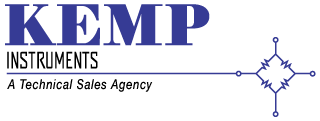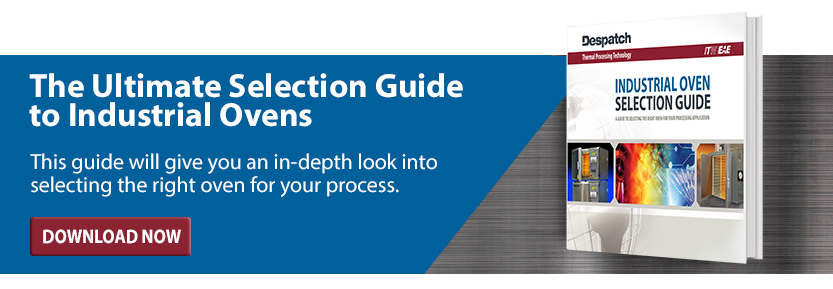INDUSTRIAL OVENS FROM THE LEADER IN THE INDUSTRY
 With over 100 years of experience, Despatch has provided equipment for nearly every thermal processing application and has the technical capability to modify existing designs to meet next generation requirements.
With over 100 years of experience, Despatch has provided equipment for nearly every thermal processing application and has the technical capability to modify existing designs to meet next generation requirements.
Despatch manufactures a wide range of industrial ovens that are designed to accommodate a variety of load sizes and production volumes. Regardless of your industry, you can depend on Despatch systems for all your heat processing requirements.
Despatch industrial ovens are known for:
- Tighter Temperature Tolerances: They pride themselves on precision, ensuring your processes adhere to the most stringent temperature specifications.
- Higher Yields and Consistency: Expect nothing less than optimal efficiency and unwavering consistency from their industrial ovens, ensuring your production reaches its peak potential.
- Repeatable Results: With Despatch, your results aren't just reliable; they're replicable, allowing you to maintain the highest standards in your operations.
Oven Chamber Sizes
Despatch ovens offer an almost unlimited amount of application possibilities to meet any of your batch-processing requirements. Their industrial ovens are categorized by their chamber sizes:
- Cabinet ovens and furnaces (Reach-in ovens): These compact electric or gas ovens are ideal for lower-production manufacturing. Designed for easy loading and unloading, they're versatile for a variety of processes.
- Laboratory Ovens or Benchtop Ovens: Small yet mighty, these ovens find their niche in laboratory, testing, or low-production environments.
- Walk-In Ovens and Furnaces: For medium to large-scale operations, their electric or gas walk-in ovens, easily loaded manually or by fork truck, can accommodate a variety of specific product and process needs.
- Conveyor Ovens: Continuous processing with conveyor ovens is made possible, ensuring efficient and consistent production for various applications.
When you choose a Despatch oven or furnace, you secure temperature uniformity well within specifications. Their ovens boast high-velocity uniflow airflow, ensuring both horizontal and vertical air movement for exceptional temperature uniformity. Adjustable louvers direct heated air to create a precise airflow pattern tailored to your specific parts.
Count on Despatch for unmatched expertise and industrial ovens that elevate your thermal processing capabilities to new heights.
Processes Performed by Despatch Ovens and Furnaces:
Despatch has a wide range of ovens and furnaces that are available for curing, powder coating, dehydrating, drying, heat shrinking, pre-heating, testing and many other thermal processing applications, including:
Annealing: a heat treatment process used mostly to increase the ductility and reduce the hardness of a material. It is most commonly used for treating metals, but other materials, including glass and plastics can also be annealed.
During the annealing process the metal, plastic or glass is heated to a specific temperature or color and then the material is cooled at a controlled, specified rate. This process changes the physical and chemical properties of the material to make it more malleable or improve ductility; providing stress relief and creating a new microstructure.
Heat treating: the heating and cooling of metals and alloys to achieve a desired physical and mechanical property such as strength, hardness, and resistance to fatigue or failure.
Choosing a Despatch oven or furnace will ensure you that temperature uniformity will be well within specification. Despatch ovens feature high-velocity uniflow airflow, meaning that the air moves both horizontally and vertically, offering exceptional temperature uniformity. Adjustable louvers direct heated air for a precise airflow pattern suited to specific parts.
Stress Relieving: reduces internal stresses caused by cold working or non-uniform cooling.
Aging: also referred to as precipitation hardening increases the hardness and strength of metal alloys. Both timing and temperature are critical during the hardening process. Uneven heating can create cracks and other defects, often starting from the corners or edges of the material.
Tempering: a process used to reduce the brittleness and increase the tensile strength of metal alloys after hardening.
Coatings: Once cured, the powder coating creates a tough, durable finish that is generally harder and stronger than any conventional paint finish.
























